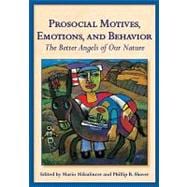
Prosocial Motives, Emotions, and Behavior The Better Angels of Our Nature
by Mikulincer, Mario; Shaver, Phillip R.Buy New
Rent Textbook
Used Textbook
We're Sorry
Sold Out
eTextbook
We're Sorry
Not Available
Summary
Author Biography
Phillip R. Shaver, PhD a social and personality psychologist, is Distinguished Professor of Psychology at the University of California, Davis. Before moving there, he served on the faculties of Columbia University, New York University, University of Denver, and State University of New York at Buffalo. He has coauthored and coedited numerous books, including In Search of Intimacy; Measures of Personality and Social Psychological Attitudes; Measures of Political Attitudes; Handbook of Attachment: Theory, Research, and Clinical Applications, and Attachment in Adulthood: Structure, Dynamics, and Change, and has published over 200 scholarly journal articles and book chapters. Shaver's research focuses on attachment, human motivation and emotion, close relationships, personality development, and the effects of meditation on behavior and the brain. He is a member of the editorial boards of Attachment and Human Development, Personal Relationships, the Journal of Personality and Social Psychology, and Emotion®, and has served on grant review panels for the National Institutes of Health and the National Science Foundation. He has been executive officer of the Society of Experimental Social Psychology and is a fellow of both the American Psychological Association and the Association for Psychological Science. Dr. Shaver received a Distinguished Career Award from the International Association for Relationship Research and has served as president of that organization.
Table of Contents
| Contributors | p. ix |
| Preface | p. xiii |
| Introduction | p. 3 |
| Theoretical Perspectives | p. 13 |
| Empathy-Induced Altruistic Motivation | p. 15 |
| Evolutionary Perspectives on Prosocial Behavior | p. 35 |
| Enduring Goodness: A Person-by-Situation Perspective on Prosocial Behavior | p. 55 |
| A Behavioral-Systems Perspective on Prosocial Behavior | p. 73 |
| Forms of Concern: A Psychoanalytic Perspective | p. 93 |
| Neuroscience Meets Social Psychology: An Integrative Approach to Human Empathy and Prosocial Behavior | p. 109 |
| Psychological Processes | p. 127 |
| Empathy-Related Responding: Links With Self-Regulation, Moral Judgment, and Moral Behavior | p. 129 |
| Genetic and Environmental Influences on Prosocial Behavior | p. 149 |
| The Effortful and Energy-Demanding Nature of Prosocial Behavior | p. 169 |
| Helping Relations as Status Relations | p. 181 |
| Compassionate Callousness: A Terror Management Perspective on Prosocial Behavior | p. 201 |
| Basic Values: How They Motivate and Inhibit Prosocial Behavior | p. 221 |
| Prosocial Emotions | p. 243 |
| Compassionate Love as a Prosocial Emotion | p. 245 |
| Does Gratitude Promote Prosocial Behavior? The Moderating Role of Attachment Security | p. 267 |
| The Malleability of Forgiveness | p. 285 |
| The Subjective Experience of Generosity | p. 303 |
| Prosocial Behavior at the Relational Level | p. 325 |
| Prosocial Motivation and Behavior in Close Relationships | p. 327 |
| Forgiveness: Integral to a Science of Close Relationships? | p. 347 |
| Responding to Need in Intimate Relationships: Social Support and Caregiving Processes in Couples | p. 367 |
| Prosocial Behavior at the Group and Societal Levels | p. 391 |
| Empathy and Intergroup Relations | p. 393 |
| A Needs-Based Model of Reconciliation: Perpetrators Need Acceptance and Victims Need Empowerment to Reconcile | p. 409 |
| Overcoming Psychological Barriers to Peacemaking: The Influence of Beliefs About Losses | p. 431 |
| Index | p. 449 |
| About the Editors | p. 467 |
| Table of Contents provided by Ingram. All Rights Reserved. |
An electronic version of this book is available through VitalSource.
This book is viewable on PC, Mac, iPhone, iPad, iPod Touch, and most smartphones.
By purchasing, you will be able to view this book online, as well as download it, for the chosen number of days.
Digital License
You are licensing a digital product for a set duration. Durations are set forth in the product description, with "Lifetime" typically meaning five (5) years of online access and permanent download to a supported device. All licenses are non-transferable.
More details can be found here.
A downloadable version of this book is available through the eCampus Reader or compatible Adobe readers.
Applications are available on iOS, Android, PC, Mac, and Windows Mobile platforms.
Please view the compatibility matrix prior to purchase.
